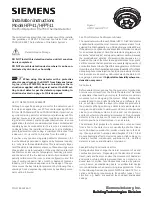
Operation & Installation Manual RFS1 V2
MA365 Rev 3
22 of 46
4
Installation
The RFS1 V2 is factory pre-wired and fully tested before delivery. After receipt of the
panel, the unit should be carefully checked for any possible mechanical damage
during transportation. Report any damage to your nearest Brooks supplier.
Carefully remove the faceplate from the panel enclosure and unplug the 4 way plug
from the main control module.
Store in a safe position until panel is installed and wired.
4.1
RFS1 V2 Surface Mounting Instructions
The RFS1 is always surface mounted however, to mount the RFS1:
1. Locate the position where the panel is to be sited.
2. Mark the position of the two mounting holes and the cable cut-outs,
knockouts available between the two mounting holes.
Note: Power and ELV cables are to be kept segregated.
3. Select the appropriate mounting hardware and prepare the two mounting
holes.
4. Fix the top two points, leaving approximately 6 mm of the protrusion from
the wall. Mount the Panel and secure all mounting hardware.
4.2
RFS1 V2 Cable Termination
4.2.1
AC Power
The 230V
AC
input is terminated on the mains 3-way terminal block (complete with
fuse holder and fuse) and earth stud provided on the rear inside of the enclosure.
4.2.2
Field Wiring
All field cabling is to be terminated on the terminals provided on the Main Control
Module as drawn in Figure 18 page 38. The panel is compatible with either the
obsoleted 200 series alarms and/or the current EIB603CX and/or EIB650iWX. These
alarms use 3 core cabling for either smoke or heat alarms on the zone.
In order to ensure that voltage drop is kept to a minimum and ensure that Smoke /
Heat Alarms operate up to 10
0m runs, use low resistance cables of 19.5 Ω/km
maximum DC resistance at 20
°
C with each core at 1.0 mm². Brooks strongly
recommends using these cables:
•
BAC4C1/100
Metre 4 core 1mm² Red Cable
•
BACAC1/250
250 Metre 4 Core1mm² Red Cable
Cables should be terminated as required, ensuring all cables are neat and secured
using plastic ties.
4.2.3
Battery
Place the Battery on the bottom of enclosure and connect leads provided.
RED
- POSITIVE
BLACK
- NEGATIVE
Note: Battery capacity calculation must be carried out based on the battery
calculation sheet to determine the battery capacity required. Failing to use the correct
battery capacity will void the compliance to AS3786:2014. Two batteries connected
in parallel might be required.







































